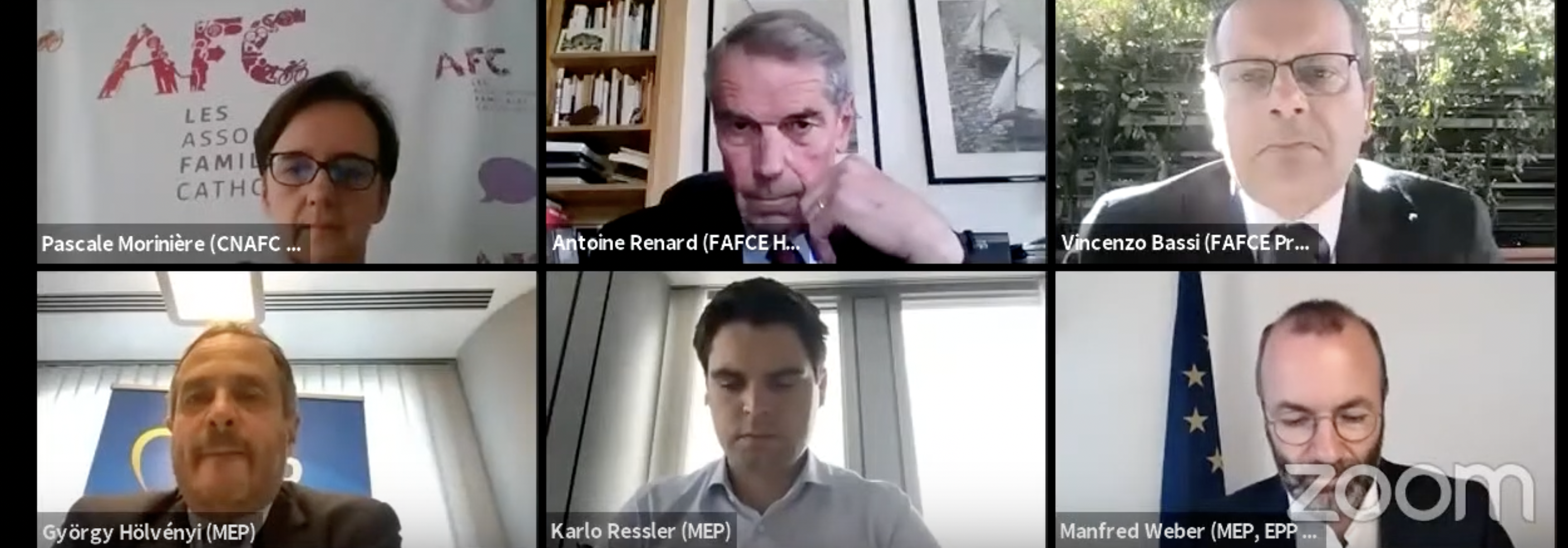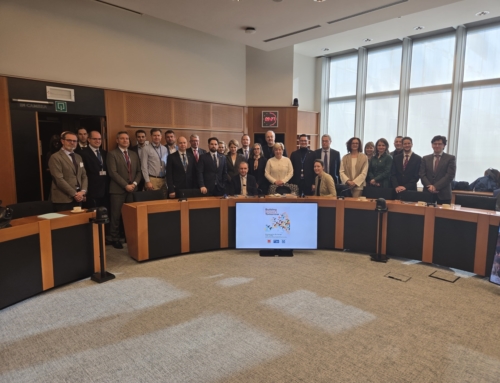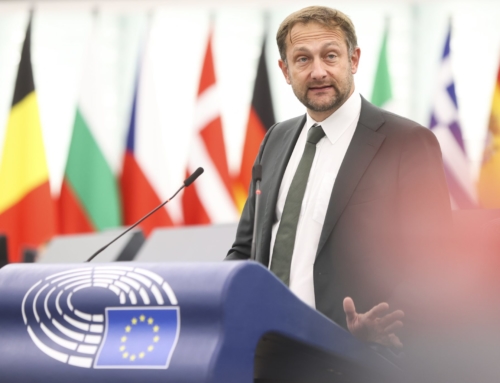4 June 2021
On June 3rd, 2021, FAFCE organised, in cooperation with the European People’s Party (EPP) working group on ‘Intercultural and religious dialogue’, a Webinar on the topic of demographic change and the future of Europe. EPP Group Chairman Manfred Weber (Germany) headlined the event, which was moderated by MEP Jan Olbrycht (Poland) and featured numerous EPP MEPs and FAFCE Members.
The event followed up on the recent General States of Birth (Stati Generali della Natalità) that took place in Rome last month, where both Pope Francis and Italian Prime Minister Mario Draghi addressed the assembled crowd. FAFCE’s Secretary General, Nicola Speranza, opened the conference by recalling Pope Francis’s admonition that “without families at the center of our present, we will have no future.”
Mr. Speranza introduced the current demographic situation in Europe, and noted that “Solidarity between the different generations cannot exist without new generations. We are moving towards a one-generation society. Thus we must act for policies centered on the family.”
Vincenzo Bassi, FAFCE President, stressed the economic implications of the demographic challenges: “Now, there is a big mismatch between accounting practices and economic reality. Demographic policies cannot be considered public expenditure. They must be considered an investment in infrastructure, education, and sustainability”. He called for fiscal justice at the national and EU levels that reflects the contributions of families to their communities.
Manfred Weber, Chairman of the EPP Group, stressed the centrality of the family as a major political issues of today. “The demographic winter is… fueling the brain-drain debate in the EU. We have to take care of young families. We need to have an attitude of respect for families, we need to respect the people who hold the future in their hands.” He also observed that, despite its importance to a host of pressing political issues, policymakers have proved hesitant to give family policy the same time and attention that they give to other social justice issues.
Roberta Metsola (Malta), First Vice-President of the European Parliament and coordinator for the Parliament´s dialogue with churches, religions and non-confessional organisations according to Article 17 of the Treaty on the Functioning of the EU, tied the issue of demography into economic and social sustainability, two primary areas of focus for the EPP. She spotlighted the fact that “This debate is ultimately about ensuring that no one is left behind. As FAFCE has pointed out, family policies will shape the future of Europe. We must assure parents that they will have a good work-life balance…considering also the role that grandparents play”.
MEP Karlo Ressler (Croatia), Vice-Chair of the Intergroup on Demographic Challenges, Family-Work Life Balance, and Youth Transitions, explained why the family is “of irreplaceable value”. He linked Europe’s demographic crisis to a crisis of values and pointed out that the family is instrumental in preserving and passing along European values. He urged the participants to see this reality, saying “Certainly we must recognize that the family is the basis of the European value system. As Pope Francis says, ‘societies that are most rich in resources are most poor in hope.” If people do not have hope in the future, they cannot be surprising that they choose not to have children.
Hölvényi György (Hungary), Co-Chairman of the EPP Working Group on Intercultural and Religious Dialogue, elaborated on this theme. He stressed that “It is one of the greatest contradictions in our time that material prosperity weakens the family. If we want a future for Europe, it is our job in the European Parliament to realize the vision of the culture of life and of family for the next generation.” Material prosperity is important for improving living standards, but cannot manage alone to maintain hope for the next generations.
Antoine Renard, Honorary President of FAFCE, connected hope to love, which he identified as a key characteristic of both post-pandemic recovery and economic flourishing in general. He said that “Without love, humans cannot live…If families start to recover again, everything will restart again. Thus we commit ourselves to giving new life to our continent. I have trust in the future and in the future of families”.
François-Xavier Bellamy, Head of the French EPP Delegation, presented the philosophical dimension of the demographic winter. He observed that “The atomisation of Western culture is not a social structure built around stable relationships, so people live in loneliness and lose their bonds. Families are fragile…The crisis of families is a crisis of our very identity. It is a major political issue.” Since families are the antidote to loneliness, families are also the bastion of identity and merit widespread support.
Pascale Morinière, President of the National Confederation of Catholic Family Associations (CNAFC), evoked the difference between the number of desired and born children, an issue to which FAFCE has devoted considerable attention. She pointed out that “Since 2014, the fertility index has therefore decreased each year … It has fallen to 1.83 children per woman in 2019. At the same time, the French still want as many children! The French would have more children, or one in two families would have one more child if each welcomed the desired number of children.” This statistic makes the link between decreased hope and decreased children impossible to misunderstand.
MEP Miriam Lexmann, Member of the Intergroup on Demographic Challenges, Family-Work Balance and Youth Transitions, also discussed the priceless value of children and denounced the political failure to reward families for giving their communities the gift of children. She said, “the Covid-19 pandemic has shown us that the family is the most important hub of social engagement we can have…and yet, many elderly parents fall into poverty when they become pensioners even though they gave society its most valuable resource.”
Ulrich Hoffmann, President of Germany’s Familienbund der Katholiken, summed up the theme of the event by saying that “Too often, work-life-balance is interpreted as a means to adapt the families to economic needs. But on the contrary, the economy should be adapted to the needs of families.” FAFCE will continue to work in this direction and hopes this webinar will mark a step towards more family-friendly policies across Europe at every level.
Please see below for the full video.







